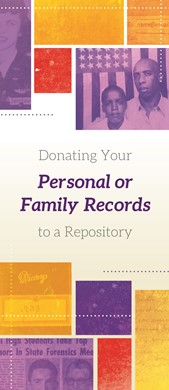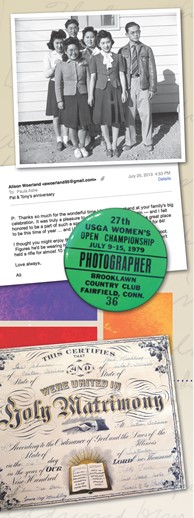- About Archives
- About SAA
- Careers
- Education
- Publications
- Advocacy
- Membership

For millennia, written records have provided essential clues to the past. Through letters, diaries, and unpublished writings of many types, and also through the audible, visual, and electronic records of recent times, researchers have been able to study and understand much about the history of particular families, communities, businesses, and organizations, the history of specific events and broader societal trends, and the history of the United States in general. Letters, emails, diaries, photos, and other material accumulated over the years give vital and unique information regarding your life or the history of your family. These materials obviously matter to you, and they may be important to your community, state, or nation, too. Whether or not members of your family attained a degree of fame, they have contributed to the heritage of a certain place and time. When you donate your personal or family records to a manuscript repository, your family history becomes a part of your community’s collective memory.
Manuscript repositories—also called archives, historical societies, and special collections libraries— carefully preserve collections of written, visual, audible, and electronic material created by private citizens both past and present. Such repositories ensure that these personal and family records will be available for research by generations to come.
A manuscript repository is run by professionals—archivists, curators, or librarians—whose priorities are the selection, the preservation, and the accessibility for research of historical materials. These professionals will discuss with you the historical significance of your records and advise you which repository would be best for your records. In addition, once you donate your records, the staff will continue to work with you as you locate or identify other materials to donate. Most repositories have a collecting policy that informs their decisions about what to accept.
If your personal or family records are deemed appropriate for a repository’s collection, and you agree to donate those materials, you stand to gain many benefits. A repository can provide the materials with environmentally controlled, secure physical and digital storage and can oversee their proper handling and use. Equally important, it can provide research access to the contents of the records, both to you and to others. In future years, researchers—including students, professors, genealogists, journalists, and many others—may thus find your records both interesting and of value to their work.
To ensure the preservation of materials for potential transfer to a manuscript repository, items should be kept in a cool, dry, temperature-stable environment. Digital materials should be backed up regularly. Most repositories accept donations of as little as a single item and as large as dozens of boxes or terabytes of digital files. To be historically significant, materials need not be organized; they need not be “old”; and they need not relate to a famous individual, event, or organization. Generally, repositories are more interested in a coherent body of material rather than individual items, and they prefer to receive the original items rather than copies. Photographs, tapes, and films should be identified. Digital directories and files should have names that indicate content or subject matter. Historical material should not be mailed or dropped off without first consulting with the staff; a repository must evaluate all material offered and ask the donor to sign a deed of gift.

Many types of material can be valuable to a researcher. A list of these can be found below. It is important that archives staff be permitted to survey collections to determine enduring historical value.
Archivists are experts in identifying materials that should be transferred to a repository or manuscript library. Because the research value of records may be diminished if items are removed or if the records are rearranged, you should contact the repository staff before weeding, discarding, or reorganizing papers and records, regardless of their location or format. It is helpful, however, if you can provide contextual information, such as names of people who appear in photographs or the stories behind significant items that document personal or family history. The archivist or curator might be able to visit your home or office to review your materials and, once you have signed a deed of gift, transfer them to the repository.
Although a repository cannot accept everything that you offer (whether because of staff and space constraints or because the materials are not within the collecting mission of the particular institution), it welcomes the chance to review material; if it is not appropriate for one repository, there may be another one to which it could be referred. Repositories focus on preserving rare and unique materials and generally do not take publications that are widely available elsewhere, such as popular magazines. Some material, too, may be of more sentimental than historical value and should be kept by the individual or family.

Listed below are types of materials in personal and family records that are often valuable to a researcher. This list, which is suggestive and not definitive, illustrates the wide range of documentation that is often useful for historical and administrative research:
Also of interest are files relating to an individual’s civic, business, religious, political, and social activities.
Please note that the above list pertains as well to digital versions of such items. The repository may prefer to capture digital material directly from your computer. Part of that process is discussing how you use your computer in your work or personal life, including organization, file names, and file storage, especially storage in places other than your personal computer. The archivist or curator will need to know the current location of all the digital material that you wish to donate, such as backup disks or thumb drives, other computing devices, networked or cloud storage, or on the Internet.
Be aware that any digital materials that you donate, including computers, computer disks, and other digital storage media, may contain passwords, web browsing history, other users’ files, and copies of seemingly deleted files.
Whether or not these files are apparent to researchers will depend on the initial method of transfer and on the repository’s access policies and procedures for handling digital material, which may change over time as technology evolves. Discuss any concerns you have about deleted content with the archivist or curator.
Churches, political organizations, businesses, economic interest groups, community groups, voluntary associations, professional associations, and other collective enterprises all create materials that document their purpose, policies, and activities. An individual or family may hold the records of such a business or organization, and this material, too, may be significant. In addition to papers and records, some repositories (or their affiliated museums or libraries) also collect artifacts, art, books, maps, and music.
Archivists can best assist you if you make an appointment in advance. If you are unsure how to contact a repository in your area, start with your state or local historical society or state archives. The Society of American Archivists (www.archivists.org) can also provide you with suggestions.
Donations
Most archives can only invest materials and labor in the preservation of items that they own. Therefore, most archives accept donations of individual or family records but generally will not accept such material on deposit or on loan. Donors are asked to sign a deed of gift, which formally signifies that the materials become the actual property of the archives.
Access to Collections
Access to donated materials is governed by the repository’s policies regarding availability, duplication, and publication. As a prospective donor, you should become familiar with such policies and discuss any special needs or concerns with the archivist or curator before completing the deed of gift. Final description of the collection may not occur immediately and repositories vary in the speed with which description of the collection is posted online. Discuss this process with the archivist or curator to learn the particular repository’s practices.
Restrictions on Access
If you are concerned that material considered confidential may be represented in your personal and family records, be prepared to identify items or groups of items of concern and then discuss with the archivist the possibility of restricting part of the collection to protect the privacy of you or others. While archives desire to make all materials freely accessible to researchers, they will agree to reasonable and equitable restrictions for limited periods of time.

Copyright
Assignment of copyright is often complex and you should work with the repository staff to clarify issues of copyright ownership. Generally, copyright belongs to the creator of writings and other original material (such as photos and music) but can be legally transferred to heirs or others. In addition, ownership of copyright is separate from ownership of the physical item (the letter or photo). Archivists often ask donors to donate not only the physical papers but also any copyright in them that the donor might own. This request makes it easier for researchers to use portions of the materials in their work.
Under the terms of U.S. Copyright Law, repositories may provide copies of items in their collections for scholarly research use. Under the “fair use” exemption, the law permits that researchers may publish portions of an item under copyright. Permission to publish or quote extensively from the material must still be obtained from the copyright holder. To learn more about copyright, see www.copyright.gov, or ask your attorney.
Conditional Gifts
A repository usually is unable to promise that donated materials will be exhibited or used in some other specific fashion as a condition of accepting the gift.
Monetary Appraisals for Tax Deductions
In certain circumstances, it may be possible for a donor to take a tax deduction for the donation of a collection to a repository. Speak with your tax accountant or attorney about this possibility. Archivists cannot give tax advice nor are they permitted to appraise the monetary value of a collection that is under consideration for donation to their repository. The archivist may be able to provide you with a list of local manuscript appraisers who can (for a fee) make monetary appraisals. It is up to you, as the donor, to arrange and pay for any such appraisal. Some repositories are able to make the collection available to an appraiser hired by the donor while others prefer that the appraisal take place before transfer to the repository.
Monetary Donations
Most repositories are non-profit organizations. Preparing materials for use by researchers is the most expensive operation in a repository. Although such monetary donations are rarely a prerequisite for the acceptance of a collection, donors who are able to assist repositories by providing funds toward the arrangement, cataloging, and conservation of their personal or family records are encouraged to discuss the possibility with the archivist.
This work is licensed under a Creative Commons Attribution 4.0 International License.